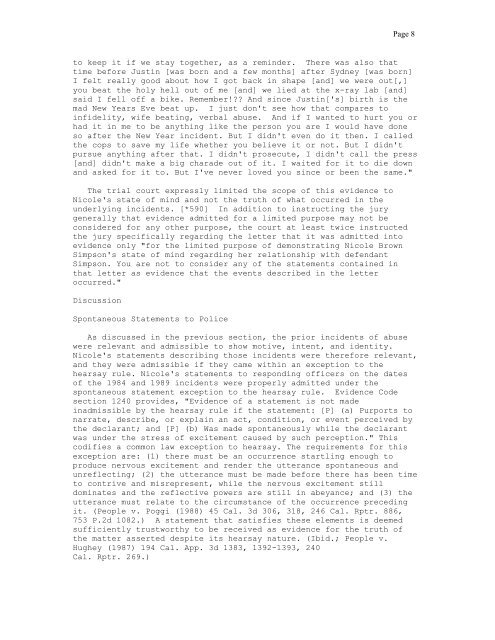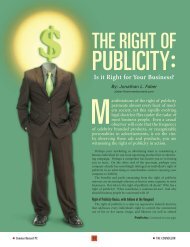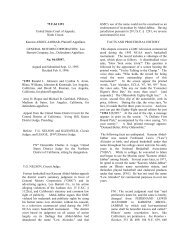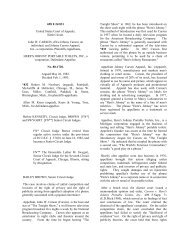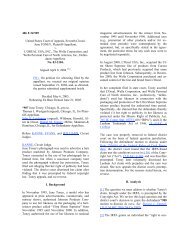Rufo v. OJ Simpson - Right Of Publicity
Rufo v. OJ Simpson - Right Of Publicity
Rufo v. OJ Simpson - Right Of Publicity
You also want an ePaper? Increase the reach of your titles
YUMPU automatically turns print PDFs into web optimized ePapers that Google loves.
Page 8<br />
to keep it if we stay together, as a reminder. There was also that<br />
time before Justin [was born and a few months] after Sydney [was born]<br />
I felt really good about how I got back in shape [and] we were out[,]<br />
you beat the holy hell out of me [and] we lied at the x-ray lab [and]<br />
said I fell off a bike. Remember! And since Justin['s] birth is the<br />
mad New Years Eve beat up. I just don't see how that compares to<br />
infidelity, wife beating, verbal abuse. And if I wanted to hurt you or<br />
had it in me to be anything like the person you are I would have done<br />
so after the New Year incident. But I didn't even do it then. I called<br />
the cops to save my life whether you believe it or not. But I didn't<br />
pursue anything after that. I didn't prosecute, I didn't call the press<br />
[and] didn't make a big charade out of it. I waited for it to die down<br />
and asked for it to. But I've never loved you since or been the same."<br />
The trial court expressly limited the scope of this evidence to<br />
Nicole's state of mind and not the truth of what occurred in the<br />
underlying incidents. [*590] In addition to instructing the jury<br />
generally that evidence admitted for a limited purpose may not be<br />
considered for any other purpose, the court at least twice instructed<br />
the jury specifically regarding the letter that it was admitted into<br />
evidence only "for the limited purpose of demonstrating Nicole Brown<br />
<strong>Simpson</strong>'s state of mind regarding her relationship with defendant<br />
<strong>Simpson</strong>. You are not to consider any of the statements contained in<br />
that letter as evidence that the events described in the letter<br />
occurred."<br />
Discussion<br />
Spontaneous Statements to Police<br />
As discussed in the previous section, the prior incidents of abuse<br />
were relevant and admissible to show motive, intent, and identity.<br />
Nicole's statements describing those incidents were therefore relevant,<br />
and they were admissible if they came within an exception to the<br />
hearsay rule. Nicole's statements to responding officers on the dates<br />
of the 1984 and 1989 incidents were properly admitted under the<br />
spontaneous statement exception to the hearsay rule. Evidence Code<br />
section 1240 provides, "Evidence of a statement is not made<br />
inadmissible by the hearsay rule if the statement: [P] (a) Purports to<br />
narrate, describe, or explain an act, condition, or event perceived by<br />
the declarant; and [P] (b) Was made spontaneously while the declarant<br />
was under the stress of excitement caused by such perception." This<br />
codifies a common law exception to hearsay. The requirements for this<br />
exception are: (1) there must be an occurrence startling enough to<br />
produce nervous excitement and render the utterance spontaneous and<br />
unreflecting; (2) the utterance must be made before there has been time<br />
to contrive and misrepresent, while the nervous excitement still<br />
dominates and the reflective powers are still in abeyance; and (3) the<br />
utterance must relate to the circumstance of the occurrence preceding<br />
it. (People v. Poggi (1988) 45 Cal. 3d 306, 318, 246 Cal. Rptr. 886,<br />
753 P.2d 1082.) A statement that satisfies these elements is deemed<br />
sufficiently trustworthy to be received as evidence for the truth of<br />
the matter asserted despite its hearsay nature. (Ibid.; People v.<br />
Hughey (1987) 194 Cal. App. 3d 1383, 1392-1393, 240<br />
Cal. Rptr. 269.)


